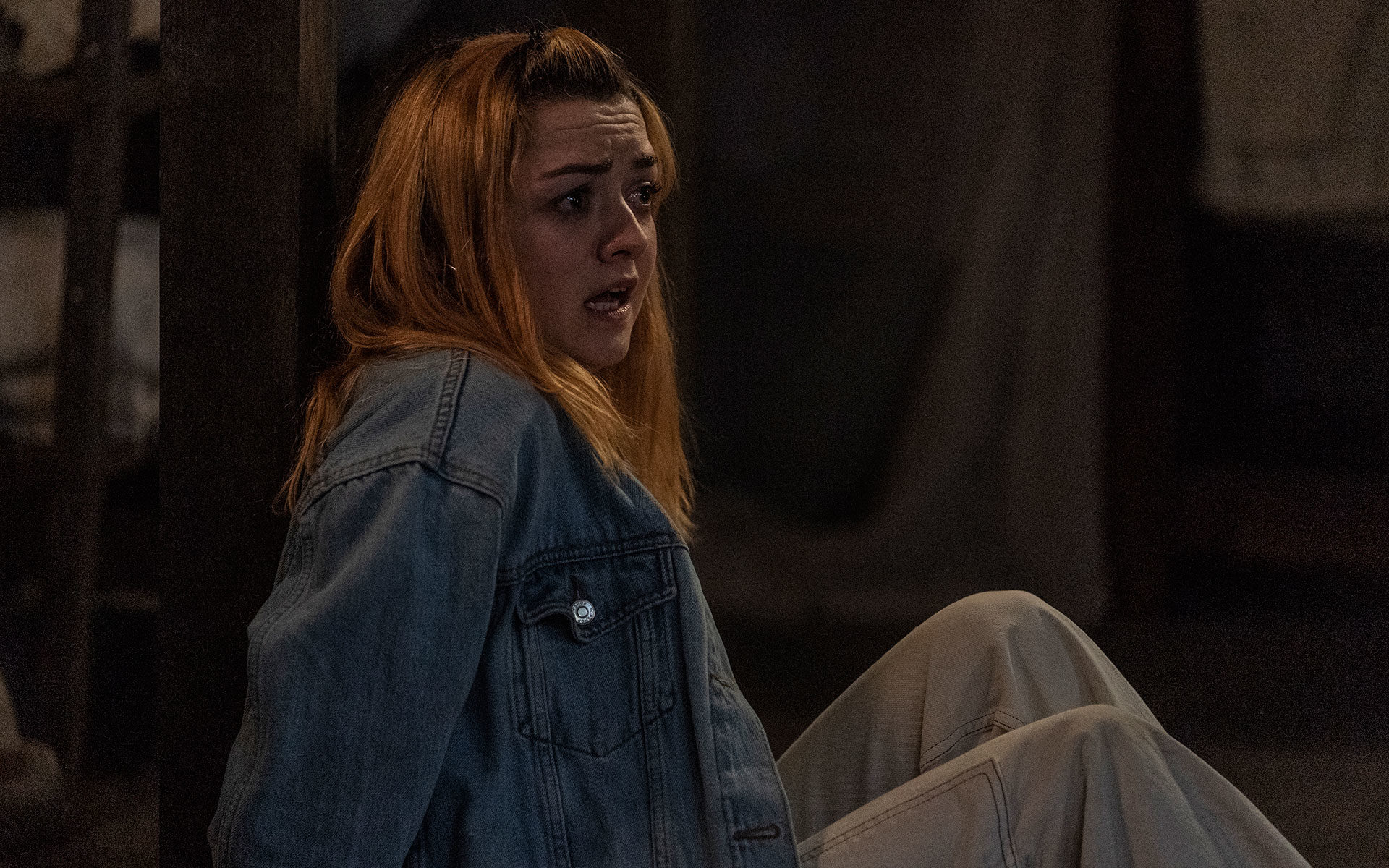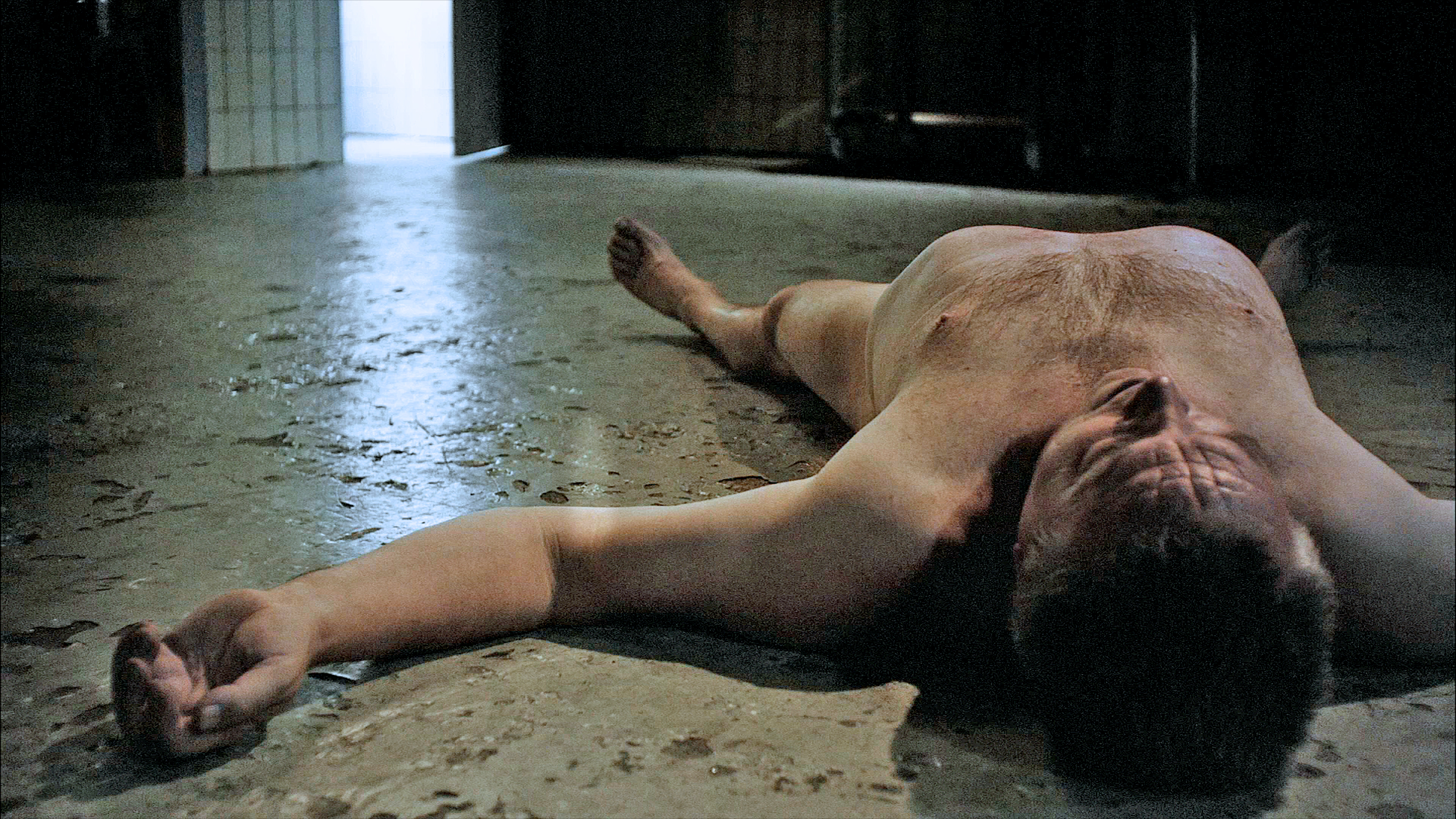Possessor opens with a glossy murder sequence that seems to be the jumping-off point for a glossy techno-thriller. The killer is revealed to be an assassin who operates by taking over the minds of working-class stiffs who are in a position to be close enough to various VIPs to carry out quick hits. Each unlucky prole chews on a bullet as the possessor controlling their actions blinks out of the equation and returns to her own body. Having established the kind of killer premise that an enterprising show-runner could use as fodder for two, maybe three seasons of a Netflix original, the film gets restless and almost immediately veers into uncharted territory, as the apparently imperturbable killer Tasya Vos (tough, wiry and tender Andrea Riseborough) reveals herself to be distracted by concerns over her disintegrated family life-and perhaps unfit to fight back when one of her meat puppets, a rank-and-file big-tech employee named Colin (Christopher Abbott), manages to rebel against her control.
Continue readingThe Owners
56/100A trio of small-time crooks looking to swipe an elderly couple’s retirement savings get in over their heads in The Owners, a diverting if derivative crime drama with horror-movie undertones set in and around a single house somewhere on the English countryside. Nathan (Ian Kenny), Terry (Andrew Ellis) and Gaz (Jake Curran) are neighborhood boys who’ve gotten wind that a massive bundle of cash is stashed in a safe beneath the Victorian home shared by Richard Huggins (Sylvester McCoy) and his wife Ellen (Rita Tushingham). The trio plan to help themselves to the loot while the geezers are dining out; Maisie Williams is Nathan’s girlfriend Mary, whose unexpected arrival on the scene adds logistical and emotional complications that multiply once the Hugginses arrive home unexpectedly early.
Continue readingBrimstone
45/100In a country where Paul Verhoeven represents cinéma du papa, it makes sense that a younger generation of filmmakers would produce something like Brimstone. Calling back to Verhoeven’s earthy, sex-drenched cinema of the 1970s, but updating it with the gory sensibilities of a contemporary horror movie, Brimstone is a spectacularly lurid melodrama that seeks to excuse indulgences both bloody and lewd by catching them up in a lecture about runaway misogyny, which is used as a stick with which to beat its heroine nearly to death over and over again. Brimstone is the kind of movie where a bullet wound is rarely just a bullet wound — generally it’s the goo-slick remnants of a head shot, with blood spatter plus a little puddle, and a few gobbets of brain matter sprinkled around the scene like so much sea salt on a plate of raw meat. It’s the kind of movie where a child is not only placed in peril, but is outright tortured on screen. And it’s the kind of movie where a woman absolutely, positively cannot catch a goddamned break. Continue reading
Meat
57/100Philly-based distributor Artsploitation Films has just pulled a Dutch film called Meat (aka Vlees, 2010) out of the freezer, and it’s kind of a doozy. Produced by Amsterdam-based co-directors Maartje Seyferth and Victor Nieuwenhuijs (she’s the writer, he’s the cinematographer), Meat is a nonlinear murder mystery that starts out as day-in-the-life middle-aged sexual intrigue, morphs briefly into one of those young-people-and-discotheques Euroflicks, and finally turns into a post-modern police procedural. It’s not much of a whodunit, but it’s a pretty good example of a 21st-century grindhouse film, serving up pungent elements of low-budget horror and surrealism with erotic aromatics and a permeating abattoir stench. But I don’t want to oversell it. Just think Luis Buñuel crossed with Jörg Buttgereit. Continue reading
The Babadook
61/100The most feted horror film of the year, The Babadook is an exercise in psychological horror that mixes elements from Roman Polanski’s Repulsion and Stanley Kubrick’s The Shining. Delving into the fraying emotional states of a woman and her special-needs son, director Jennifer Kent spins a harrowing yarn about the terror that accompanies the pleasures of motherhood — the fear that you will be unable to do enough, to muster all the spirit and goodheartedness that are required, to care for your child.
The Zero Theorem
45/100The list of things Terry Gilliam doesn’t like includes iPhones, earphones, computers in general, advertising, modern pop music, and the yawning vacuum at the end of the universe. Gilliam drafts Christof Waltz as his beaten-down-by-bureaucracy surrogate this time around, casting him as a kind of genius math whiz who’s put to work as a kind of human calculator, performing numeric operations to help prove the titular postulation about the fate of the universe and the meaninglessness to which it suggests human existence amounts.
It’s schematic and mostly redundant in Gilliam’s body of work, but still there’s stuff to like here, including the performances (David Thewlis does a mean Michael Palin, as it turns out) and some of the production design. I liked the parody of targeted advertising, in which annoying talking billboards follow right on your heels as you walk down the sidewalks of the future. I was pretty impressed, even, by Gilliam’s crude-by-CG-standards visualization of mathematical problem-solving as a huge three-dimensional puzzle, especially the deflating moments when huge masses of perfectly stacked building blocks come tumbling down, another big idea collapsed into rubble. (Gilliam knows a thing or two about that kind of heartbreak.)
There are some striking moments where the grim conditions of Waltz’s life are compared to the benevolent, it’s-always-the-golden-hour fantasies that a virtual-reality suit bestows, but mostly it feels like Gilliam is directing a screenplay written by a tyro who was really, really impressed by Brazil — homage becomes cannibalization, and as Big Statements go The Zero Theorem doesn’t add anything to what Gilliam’s delivered before. Part of the problem is surely budgetary, lack of funds limiting the film’s visual scope and finesse. On the other hand, there’s that script. Emotionally stunted hooker with a heart of gold falls in love with disturbed hermit 25 years her elder? Ye gods, Gilliam, you can do better than this.
Snowpiercer
75/100The first half of this is dynamite. Though the concept is derivative of any number of sci-fi conceits, Bong’s visual imagination lends the hoary old scenario some striking imagery — a masked army wielding hatchets, a man with a flash-frozen arm, Tilda Swinton whipping out a denture — and while he’s not the world’s greatest action director, he does know his way around a bloody set piece.
The central metaphor — a passenger train running around the world in infinite circles gives the swells the run of the front cars and relegates the poors to the back — just keeps chugging along for most of the film’s running time but eventually starts to creak under its weight and call attention to its artificiality. (As someone on my Twitter feed asked: do the kids have to walk through the rave every day on their way to school?* However, when the schoolteacher turns out to be an absolutely ferocious Alison Pill, I can forgive all kinds of artifice.)
It really does run out of steam once it reaches The Hall of the Exposition King and lurches toward not a happy ending but at least a hopeful one. Still bracing. Terry Gilliam would have had a field day with this material — and Bong knows it, which is part of what makes the whole production so much fun. I want to call it the best science-fiction movie of the year (take that, Dawn of the Planet of the Apes) and then I remember Under the Skin and I nod solemnly and shiver a little. That’s a science-fiction movie. (Technically a 2013 release? Note to self.) But this one is really good, too. And the one about the apes isn’t even half-bad. Imagine, a cycle of excellent SF films in 2014. What did we do to deserve this?
* Judging from this diagram, I guess the answer is “No,” but it sort of feels like that’s the case when you’re watching.




